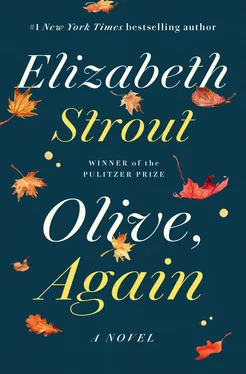Cindy had not thought of that. She had thought that Tom, and her sons, and—people—that they would go on living forever and ever, without her. But Olive was right: They were all headed where she was going. If she was going.
“Thank you,” Cindy said. “And thank you for coming over.”
Olive Kitteridge stood up. “Bye now,” she said.
When Cindy’s mother was dying—she had been fifty-two and Cindy had been thirty-two—her mother had screamed and wept and cursed Cindy’s father for abandoning them years before. In truth, Cindy’s mother had frequently, during Cindy’s lifetime, screamed and wept; the poor woman had been so tired. But when her mother was dying it scared Cindy terrifically, how her mother carried on, and she had thought to herself: I will not die that way. And this is why she felt so bad that she had done that to her sons by crying hard on the stairs on Christmas Day. Cindy had not, during her sons’ lives, screamed and wept. Cindy had cared for them every single second, it seemed like this to her, and she had hugged them and held them when they were small and needed comfort.
She thought about this a great deal, and she thought about it a few nights later as she sat next to Tom on the couch, a blanket pulled up to her throat, watching television with him. She said, during a television commercial, “Honey, I feel so bad about that day I cried on the stairs with you and the boys here. I told Mrs. Kitteridge. I forgot to tell her it reminds me of my mother.”
Tom pulled back and looked at her quickly. “Mrs. Kitteridge? Why would you tell that old bag anything so personal?”
“Well—” Cindy began.
“Did you hear she got married to Jack Kennison?”
“She did ?” Cindy started to sit up straight.
“Yes, she did. Can you imagine anyone marrying that old bag, except for her poor first husband, Henry?”
After that, Cindy didn’t say much.
A few days later the weather turned bad. It rained and was also sleeting, and as Tom was getting things ready for her—her lunch was in the refrigerator, the phone was near her bed, another cellphone was in bed with her—as he was doing these things before he went to work at the ironworks, she found that he was irritating her. “It’s okay, honey, just go,” she said.
“Are you sure?” he asked, and she said that she was sure, just please go now.
And so off he went, calling once more from down the stairs, “Goodbye, sweetie heart!” And she called back to him, and then he was finally gone.
Cindy dozed, and when she woke she was annoyed that Tom hadn’t left any lights on in the house. He was too cheap, is what she thought; it was depressing with no lights on, and so she got herself out of bed and went about the bedroom, turning on the lamp on the bureau and the one beside her bed, although through the bedroom door the hallway remained gray.
Her phone whistled. There was a text from her sister-in-law Anita, asking, Can I call? Cindy sat on the edge of the bed and texted back Yes.
“You doing okay?” asked Anita. And Cindy said, yeah, it was the same as usual.
“Sorry I haven’t been by this week, I’ll come soon.” And Anita started to speak of her problems at home, which Cindy felt bad for—Anita’s kids were all kind of crazy; they were in high school. Cindy got up to walk into the hallway to turn more lights on, and she heard a car in the driveway, and going over to look out the window she saw Mrs. Kitteridge getting out of her car.
“Anita,” Cindy said, “Mrs. Kitteridge just drove up. I told you how she came to visit me. Well, she’s here again.”
Anita laughed. “Well, have a good time. Like I said, I always kind of liked that woman, myself.”
The rain was coming down hard, and Mrs. Kitteridge did not have an umbrella. Cindy rapped on the window, and Mrs. Kitteridge looked up. Cindy waved her arm for Mrs. Kitteridge to come in, then she pointed to the side door, and in a few minutes the side door had opened and closed and there was Mrs. Kitteridge standing in her coat at the bedroom door.
“Take off your coat,” Cindy said. “I’m sorry you got wet. Just throw it on the floor. Unless you want it hung up. If you want it hung up, then—” But Mrs. Kitteridge tossed her coat, the same red puffy one, onto the rug and she sat down in the straight-backed chair once again. Her hair was plastered to her head from the rain. Drops landed on her collar and she stood up and said to Cindy, “Where’s the bathroom?” And Cindy indicated where it was, and in a moment Olive came back with a pink-and-white-striped hand towel and she sat down again and toweled her hair; Cindy kind of couldn’t believe it.
Cindy said, “Mrs. Kitteridge, did you get married? Tom said he heard you married Jack Kennison, but I thought, That can’t be right.”
Olive Kitteridge held the towel above her head and looked at the wall. She said, “Yes, it’s true. I have married Jack Kennison.”
Cindy stared at her. “Well, congratulations. I guess. Is it weird?”
“Oh, it’s weird.” Olive looked at her and nodded. “It is weird, yessiree.” Olive hesitated, and then, starting to dry her hair again, she added, “But we’re both old enough to know things now, and that’s good.”
“What things?”
“When to shut up, mainly.”
“What things do you shut up about?” Cindy asked, and Olive seemed to think about it, and then she said, “Well, for example, when he has his breakfast, I don’t say to him, Jack, why the hell do you have to scrape your bowl so hard.”
Cindy asked, “How long have you been married?”
“Coming up to almost two years, I guess. Imagine at my age, starting over again.” Olive put the towel in her lap and raised one opened hand slightly. “But it’s never starting over, Cindy, it’s just continuing on.”
For quite a while they sat in silence, and the rain could be heard on the roof. And then Olive said, “I don’t imagine you want to think of Tom starting over.”
Cindy let out a great sigh. “Oh, Mrs. Kitteridge, I can’t stand to think of him alone. I can’t stand it, really, I can’t. He’d be just a— Oh, he’d be like a big huge baby all alone, and that breaks my heart. But that he might be with someone, it breaks my heart more.”
Olive nodded as though she understood this. “You know, Cindy, you and Tom grew up together. Henry and I were like that. Eighteen when we met, twenty-one when we married, and the truth is—that’s who you lived with, that never ever goes away.” Olive gave a shrug. “It just doesn’t.”
“Do you talk about Henry to Jack Kennison?”
Olive looked at her. “Oh, yes. When Jack and I first met, we talked about his wife and my husband nonstop. Nonstop.”
“Was that uncomfortable?”
“God, no. It was wonderful.”
Cindy lay silent for a while. “I don’t know that I want to be talked about.”
Olive shrugged. “Not much you can do about it, if it comes to that. But I’ll tell you this, you will be sainted. You will become an absolute saint.”
Cindy laughed. She laughed! And Olive, after a moment, laughed as well.
Then Cindy said, “Your son. Does he like this Jack Kennison?”
Olive said nothing for a moment. Then she said, “No, he does not. But I don’t think he likes me much either. Even before I married Jack.”
“Oh, Olive, I’m sorry.”
Читать дальше













